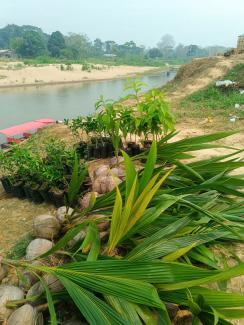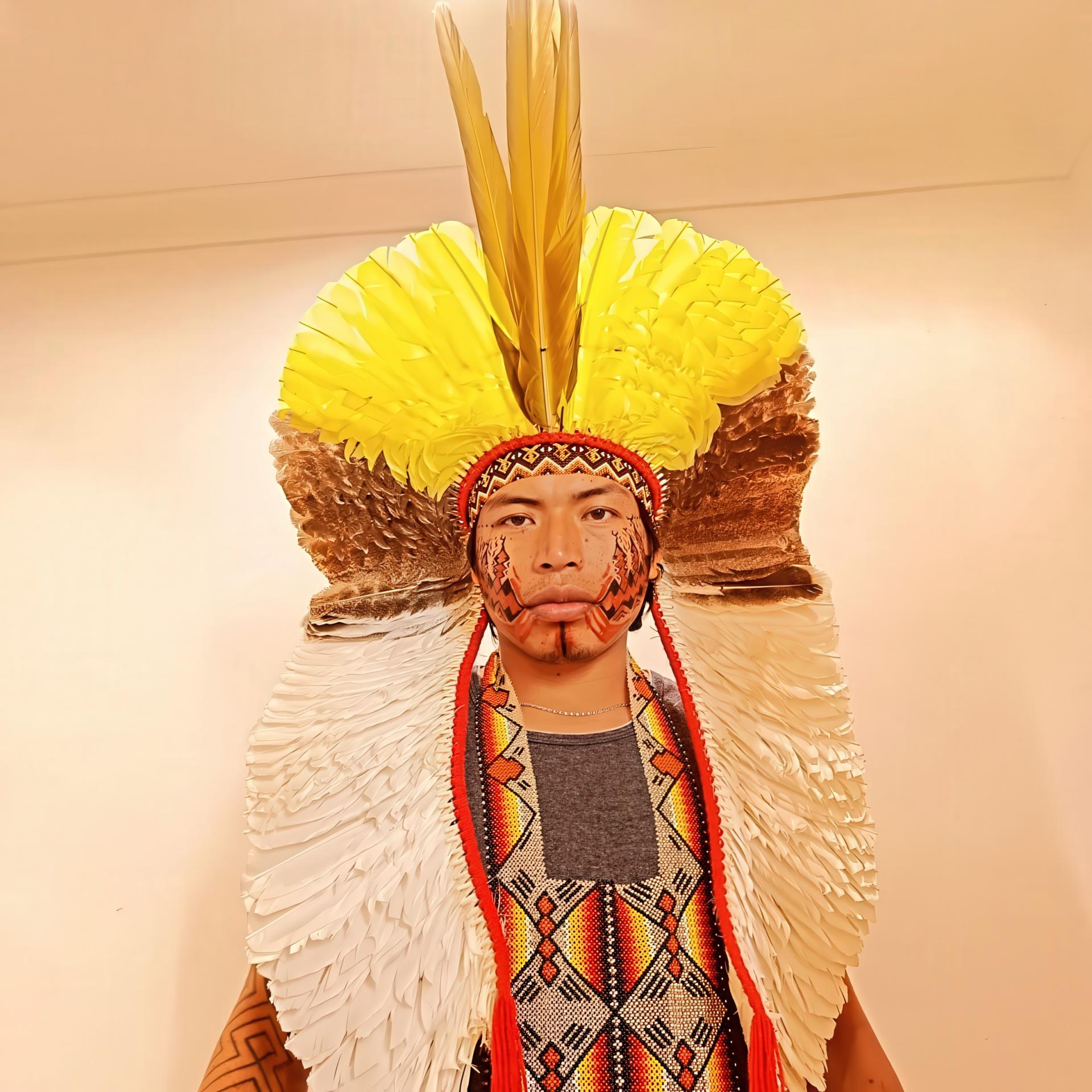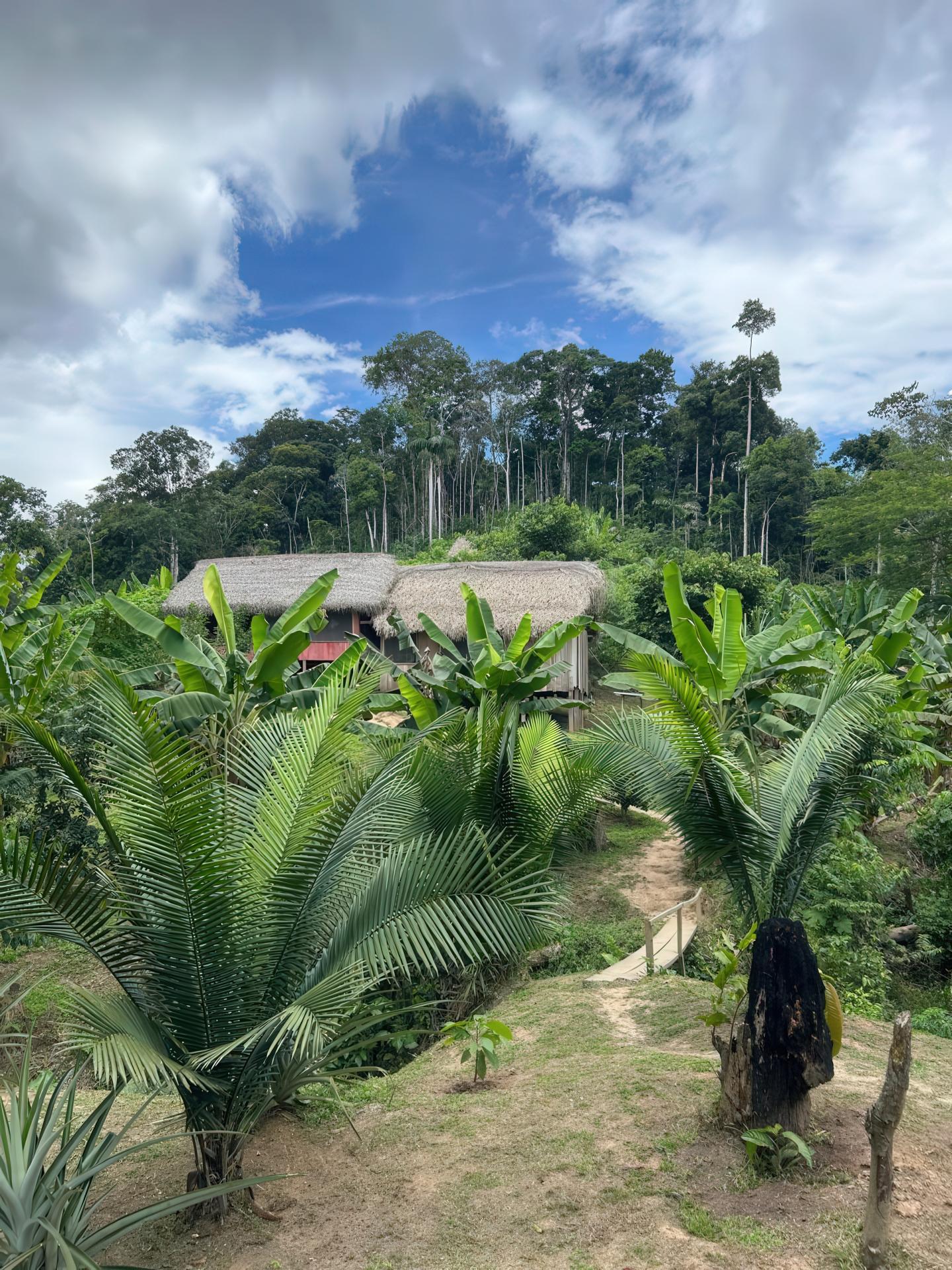
João Felipe Yawanawá da Silva (Yawanawá), also known as Tuata, comes from a family of traditional farmers and healers. He carries his family’s legacy through his work with traditional medicines and agriculture, receiving inspiration for his art and strength for his work from nature. Tuata is a 2024 Cultural Survival Indigenous Youth Fellow.
The Yawanawá Peoples live on the Gregório River Indigenous land at the headwaters of the Gregório River, located in the municipality of Tarauacá, Acre, in the Brazilian Amazon. “We are known as the ‘peccary people.’ In our language, yawa is the porcupine of the forest, the peccary, and nawa means people. There are currently around 1,300 of us. We are always gathered together, working collectively,” Tauta says.
Together with his family, Tuata is the founder and leader of the Emâ Vena Center, which was born from a collective dream. In the Yawanawá language, Emâ Vena means “new place,” a fresh start, the beginning of a new life and time. It is also the name of Tuata’s Fellowship project.
Having learned from his grandfather the joys of planting, finishing, and hunting in his traditional territory and the value of providing food to family and community, Tuata realized there was an urgent need for greater food sovereignty among the Yawanawá Peoples. The large distances between his territory and the few surrounding cities, combined with transportation challenges and dependency on foreign food sources, motivated him to connect to his tradition and start working the land.

João Felipe Yawanawá da Silva.
Tuata started by focusing on fruits and vegetables— crops through which food autonomy could be achieved. Among the trees planted were banana, lemon, orange, avocado, tangerine, and papaya. He also planted peppers and local species such as cupuassu, cassava, and açaí berry. Tuata oversaw all steps of the project, which involved selecting planting areas, preparing the soil, laying the beds, gathering seedlings, planting, and taking care of the young plants. “I learned a lot about how to allocate the funds and plan the activities. It was a challenge, and I felt a great responsibility. We succeeded through hard work and respect, learning and growing with each other,” he says.
While Tuata led most of the activities, friends and family members were also deeply involved. The community was drawn together by a common goal, understanding that the benefits from the work would be shared by all.
Nature was a constant inspiration for Tuata, but it also posed his biggest challenge. In 2024, the Amazon faced its worst-ever rainfall deficit, so significant that the main rivers in the Amazon basin had their lowest levels in history. Tarauacá spent the entire year in drought, registering some of the most extreme levels recorded in the Amazon region.

This acute drought, understood as a product of climate change and deforestation, coincided with the early phases of the Emâ Vena project, when the plants were at their most vulnerable. Tuata watched his first seedlings suffer from these harsh conditions, and many were lost. He says that his initial enthusiasm was shaken, but through dedication, collaboration, and hard work, they overcame the challenge. “It was so dry, even the fish in the river died. But some plants resisted, and that was beautiful,” he recalls.
Though his fellowship project has concluded, Tuata is motivated to continue the work. “My desire is to continue planting more and having more trees. This is what I envision for my life here, for my home, for my family, and my community—to have fruit and food not only for me, but for all of those who come to our house and our village; to take from our land, our home, and offer to our family, our children.”
Tuata also dreams of reforesting his territory with native trees and beginning a nii pei (medicinal plants) garden, guaranteeing the cultural maintenance of both the plant species and the Traditional Knowledge around these medicines. “The nii pei take care of our body, health, and spirit. Without health, we can’t look after our families and our forest. It’s very important knowledge for our Peoples and it must continue to be passed on to younger generations.”
Top photo: Seedlings arriving at the village.
